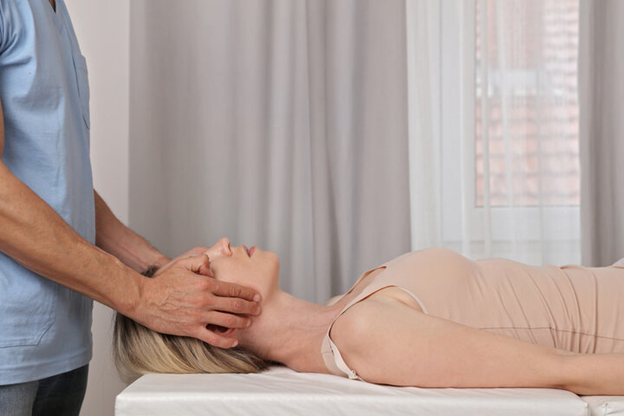
Temporomandibular Joint (TMJ) dysfunction is a common condition that affects the jaw joint and surrounding muscles, leading to pain, discomfort, and restricted movement. TMJ disorder (TMD) can cause a variety of symptoms, such as jaw pain, headaches, earaches, and difficulty chewing, which can significantly impact daily life. Fortunately, physical therapy (PT) has proven to be a highly effective and non-invasive treatment option for managing TMJ dysfunction. In this blog, we’ll explore how physical therapy can help alleviate TMJ symptoms, improve jaw function, and prevent future flare-ups.
TMJ dysfunction refers to a group of disorders that affect the temporomandibular joint—the joint that connects your jawbone to your skull. This joint is responsible for the up-and-down and side-to-side movements of the jaw, which allow you to speak, chew, and swallow. TMJ dysfunction occurs when there is an issue with the joint or the muscles surrounding it, often resulting in pain, stiffness, or popping sounds.
Several factors can contribute to TMJ dysfunction, including:
Symptoms of TMJ dysfunction can range from mild to severe and may include jaw pain, headaches, earaches, difficulty opening or closing the mouth, and clicking or popping sounds when moving the jaw.
Physical therapy plays a crucial role in treating TMJ dysfunction by addressing the underlying causes of jaw pain, restoring proper movement, and improving muscle function. Unlike medications or surgical interventions, PT focuses on natural, non-invasive techniques to reduce pain and enhance mobility. Here are several ways physical therapy can help with TMJ disorder:
One of the primary ways physical therapy addresses TMJ dysfunction is through exercises that strengthen and stretch the muscles around the jaw and neck. These exercises are designed to improve the alignment of the jaw, increase flexibility, and reduce muscle tension, which can alleviate pain and discomfort.
Common exercises prescribed by physical therapists include:
Physical therapists use hands-on techniques to manipulate and mobilize the jaw and surrounding muscles. These manual therapy techniques can provide immediate relief for TMJ pain and improve joint mobility. Manual therapy may include:
A key aspect of physical therapy is educating patients about their condition and providing them with the tools to manage their symptoms at home. Your physical therapist will teach you techniques to avoid exacerbating TMJ pain and prevent future flare-ups. This may include:
By addressing the root causes of TMJ dysfunction, physical therapy helps to restore proper jaw function, reduce muscle tension, and prevent the recurrence of symptoms. As you progress through therapy, your therapist will adjust your treatment plan to ensure continuous improvement. Over time, you’ll regain full jaw function and experience fewer flare-ups of pain or discomfort.
Physical therapy offers numerous benefits for those suffering from TMJ dysfunction, including:
If you’re experiencing symptoms of TMJ dysfunction, it’s important to seek treatment early. If your pain is persistent or severe, or if you notice difficulty opening or closing your mouth, it’s time to consult with a healthcare provider. A physical therapist will evaluate your symptoms, create a personalized treatment plan, and help you work towards pain relief and improved jaw function.
If you’re struggling with TMJ dysfunction and want a safe, effective, and non-invasive solution, physical therapy could be the answer. At Medical and Sports Center, our team of experienced physical therapists specializes in treating TMJ disorders and helping patients regain a pain-free life.
Don’t let TMJ pain control your life. Call (972) 723-1155 to schedule an appointment and start your journey towards lasting relief with tailored physical therapy treatment!